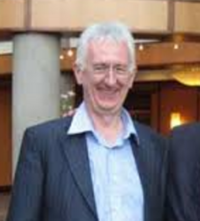Peter White
Peter D. White is a British psychiatrist. He is Professor of Psychological Medicine, honorary consultant liaison psychiatrist at St Bartholomew's hospital and co-leads the chronic fatigue syndrome (CFS) service. Prof White was the lead investigator on the PACE trial. Prof White also funded and was involved in the Cochrane review of GET.[1]
Links to Insurance Industry[edit | edit source]
Peter White has consulted for the insurance industry.[2] He did not disclose his financial conflicts of interest to the participants of the PACE Trial, of which he was the lead investigator.[1] David Tuller has written critically about the links the PACE trial investigators have to the insurance industry.[3]
Prof White resigned from clinical practice just before he was compelled by an order of the court to release the raw data from the PACE trial.[1]
Notable studies[edit | edit source]
- 2017, Response to: "Do more people recover from chronic fatigue syndrome with cognitive behaviour therapy or graded exercise therapy than with other treatments?"
"ABSTRACT - Background: Wilshire et al. suggest that we have overestimated the number of patients that recover from chronic fatigue syndrome (CFS) after receiving a course of either cognitive behaviour therapy (CBT) or graded exercise therapy (GET), as reported in a secondary analysis of outcome data from the Pacing, graded Activity and Cognitive behavior therapy; a randomized Evaluation (PACE) trial. We provide counter-arguments to this view. Purpose: To provide an alternative view to that offered by Wilshire et al. Methods: We review the two different analyses of PACE trial outcome data to estimate recovery, and compare these to other published trials and cohort studies. Results: While there is no gold standard for recovery from CFS, previous trials and cohort studies provide support for our analysis of recovery in the PACE trial. Our finding that 22% of participants recover from the current episode of CFS after either CBT or GET, compared to 8% after adaptive pacing therapy and 7% after specialist medical care alone, is consistent with the literature. Conclusions: Our original conclusions that '… recovery from CFS is possible, and that CBT and GET are the therapies most likely to lead to recovery’ is an important, reasonable, and hopeful message for both clinicians and patients."[4]
- 2016, Complementary and alternative healthcare use by participants in the PACE trial of treatments for chronic fatigue syndrome
- 2003, Identification of ambiguities in the 1994 chronic fatigue syndrome research case definition and recommendations for resolution[5]
Talks & interviews[edit | edit source]
- What is CFS, and what is ME? Bergen, October 20 2009
- What causes CFS/ME, and does this determine treatment? Bergen, October 20 2009
- Treatments for chronic fatigue syndrome. Bergen, 20 October 2009
- Royal Society of Medicine, 28 April 2008 (Transcript)
- BBC You & Yours transcript, 5 November 2007
Books[edit | edit source]
Online presence/List of Publications[edit | edit source]
[edit | edit source]
Peter Denton White is a director and has 2 total appointments. He is a director of OneHealth (Company number 04364122) from 2002 to 2010. The memorandum of association states that the purpose is to promote the biopsychosocial model of illness. He is also a director of Added Value Advisory Services (Company number 03764154) from 1999 to date.
None of these have been disclosed in his research work and publications.
Learn more[edit | edit source]
- 2016, 'Proof Positive (Revisited)' (14 Sep 2016)
- 2016, ‘It was like being buried alive’: battle to recover from chronic fatigue syndrome
- 2015, Institute of Medicine report - Review (8 December 2015, see also Institute of Medicine report)
See also[edit | edit source]
References[edit | edit source]
- ↑ 1.0 1.1 1.2 Williams, Margaret (September 14, 2016), Proof Positive (revisited) (PDF)
- ↑ White, Peter D (2011), "Managing claims for chronic fatigue the active way", Swiss Re (insurance), archived from the original on July 25, 2013
- ↑ Tuller, David (November 17, 2015), "Trial By Error, Continued: PACE Team's Work for Insurance Companies Is "Not Related" to PACE. Really?", Virology Blog
- ↑ Sharpe, M; Chalder, T; Johnson, AL; Goldsmith; White, PD (2017), "Response to: Do more people recover from chronic fatigue syndrome with cognitive behaviour therapy or graded exercise therapy than with other treatments?", Fatigue: Biomedicine, Health & Behavior, 5 (1), doi:10.1080/21641846.2017.1288629
- ↑ Reeves, W. C.; Lloyd, A.; Vernon, S. D.; Klimas, N.; Jason, L. A.; Bleijenberg, G.; Evengard, B.; White, P. D.; Nisenbaum, R.; Unger, E. (2003), "Identification of ambiguities in the 1994 chronic fatigue syndrome research case definition and recommendations for resolution", BMC Health Services Research, 3 (25), doi:10.1186/1472-6963-3-25


